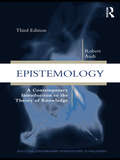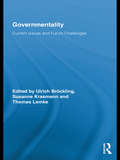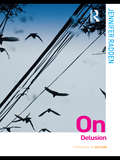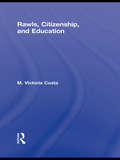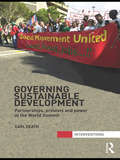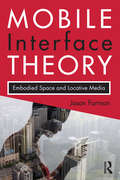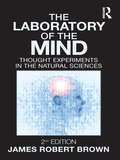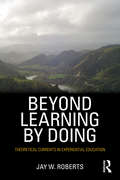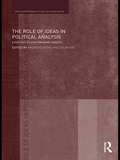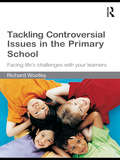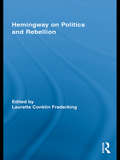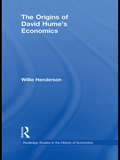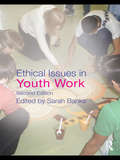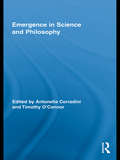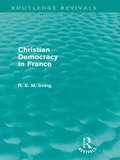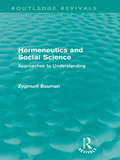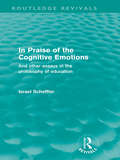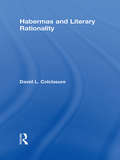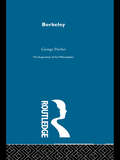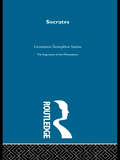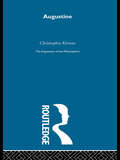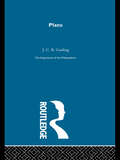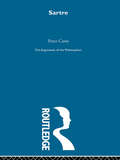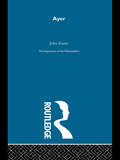- Table View
- List View
Epistemology: A Contemporary Introduction to the Theory of Knowledge (3rd Edition)
by Robert AudiEpistemology, or “the theory of knowledge,” is concerned with how we know what we know, what justifies us in believing what we believe, and what standards of evidence we should use in seeking truths about the world and human experience. This comprehensive introduction to the field of epistemology explains the concepts and theories central to understanding knowledge. Along with covering the traditional topics of the discipline in detail, Epistemology explores emerging areas of research. The third edition features new sections on such topics as the nature of intuition, the skeptical challenge of rational disagreement, and “the value problem” – the range of questions concerning why knowledge and justified true belief have value beyond that of merely true belief. Updated and expanded, Epistemology remains a superb introduction to one of the most fundamental fields of philosophy. Special features of the third edition of Epistemology include: a comprehensive survey of basic concepts, major theories, and emerging research in the field enhanced treatment of key topics such as contextualism, perception (including perceptual content), scientific hypotheses, self-evidence and the a priori, testimony, understanding, and virtue epistemology expanded discussion of the relation between epistemology and related fields, especially philosophy of mind, philosophy of science, and ethics increased clarity and ease of understanding for an undergraduate audience an updated list of key literature and annotated bibliography.
Governmentality: Current Issues and Future Challenges (Routledge Studies in Social and Political Thought)
by Ulrich BröcklingExamining questions of statehood, biopolitics, sovereignty, neoliberal reason and the economy, Governmentality explores the advantages and limitations of adopting Michel Foucault's concept of governmentality as an analytical framework. Contributors highlight the differences as well as possible convergences with alternative theoretical frameworks. By assembling authors with a wide range of different disciplinary backgrounds, from philosophy, literature, political science, sociology to medical anthropology, the book offers a fresh perspective on studies of governmentality.
Russell: Mathematics, Logic, Philosophy (The Routledge Philosophers #6)
by Gregory LandiniBertrand Russell (1872–1970) was renowned as one of the founding figures of "analytic" philosophy, and for his lasting contributions to the study of logic, philosophy of language, philosophy of mathematics and epistemology. He was also famous for his popular works, where his humanism, ethics and antipathy towards religion came through in books such as The Problems of Philosophy, Why I am Not A Christian, and The Conquest of Happiness. Beginning with an overview of Russell’s life and work, Gregory Landini carefully explains Russell’s philosophy, to show why he ranks as one of the giants of British and Twentieth century philosophy. He discusses Russell’s major early works in philosophy of mathematics, including The Principles of Mathematics, wherein Russell illuminated and developed the ideas of Gottlob Frege; and the monumental three volume work written with Alfred North Whitehead, Principia Mathematica, where the authors attempted to show that all mathematical theory is part of logic, understood as a science of structure. Landini discusses the second edition of Principia Mathematica, to show Russell’s intellectual relationship with Wittgenstein and Ramsey. He discusses Russell’s epistemology and neutral monism before concluding with a discussion on Russell’s ethics, and the relationship between science and religion. Featuring a chronology and a glossary of terms, as well as suggestions for further reading at the end of each chapter, Russell is essential reading for anyone studying philosophy, and is an ideal guidebook for those coming to Russell for the first time.
On Delusion (Thinking in Action)
by Jennifer RaddenDelusions play a fundamental role in the history of psychology, philosophy and culture, dividing not only the mad from the sane but reason from unreason. Yet the very nature and extent of delusions are poorly understood. What are delusions? How do they differ from everyday errors or mistaken beliefs? Are they scientific categories? In this superb, panoramic investigation of delusion Jennifer Radden explores these questions and more, unravelling a fascinating story that ranges from Descartes’s demon to famous first-hand accounts of delusion, such as Daniel Schreber’s Memoirs of My Nervous Illness. Radden places delusion in both a clinical and cultural context and explores a fascinating range of themes: delusions as both individually and collectively held, including the phenomenon of folies á deux; spiritual and religious delusions, in particular what distinguishes normal religious belief from delusions with religious themes; how we assess those suffering from delusion from a moral standpoint; and how we are to interpret violent actions when they are the result of delusional thinking. As well as more common delusions, such as those of grandeur, she also discusses some of the most interesting and perplexing forms of clinical delusion, such as Cotard and Capgras.
Rawls, Citizenship, and Education
by M. Victoria CostaThis book develops and applies a unified interpretation of John Rawls’ theory of justice as fairness in order to clarify the account of citizenship that Rawls relies upon, and the kind of educational policies that the state can legitimately pursue to promote social justice. Costa examines the role of the family as the "first school of justice" and its basic contribution to the moral and political development of children. It also argues that schools are necessary to supplement the education that families provide, teaching the political virtues that support just social institutions. The book also examines the questions of whether civic education should aim at cultivating patriotic feelings, and how it should respond to the deep cultural pluralism of contemporary democratic societies.
Governing Sustainable Development: Partnerships, Protests and Power at the World Summit (Interventions)
by Carl DeathMultilateral UN summits from Stockholm to Copenhagen have set the pace and direction for the global governance of sustainable development. The 2002 Johannesburg World Summit on Sustainable Development (WSSD) was a key moment in the evolution of sustainable development as a discourse and summitry as a technology of government. It firmly established multi-stakeholder partnerships, carbon-trading and communication strategies as primary techniques for dealing with environmental crises. It was also a significant event in terms of South African domestic politics, witnessing some of the largest protests since the end of Apartheid. Carl Death draws on Foucauldian governmentality literature to argue that the Johannesburg Summit was a key site for the refashioning of sustainable development as advanced liberal government; for the emergence of an exemplary logic of rule; and for the mutually interdependent relationship between ‘mega-events’ (summits, world cups, Olympic games) and ‘mega-protests’ understood as Foucauldian counter-conducts. Analysing detailed and original research on the WSSD, Death argues that summits work to make politically sustainable a global order which is manifestly unsustainable. Paradoxically however, they also provide opportunities for the status quo to be protested and resisted. This work will be of great interest to scholars of development studies, global governance and environmental politics.
Mobile Interface Theory: Embodied Space and Locative Media
by Jason FarmanMobile media – from mobile phones to smartphones to netbooks – are transforming our daily lives. We communicate, we locate, we network, we play, and much more using our mobile devices. In Mobile Interface Theory, Jason Farman demonstrates how the worldwide adoption of mobile technologies is causing a reexamination of the core ideas about what it means to live our everyday lives. He argues that mobile media’s pervasive computing model, which allows users to connect and interact with the internet while moving across a wide variety of locations, has produced a new sense of self among users – a new embodied identity that stems from virtual space and material space regularly enhancing, cooperating or disrupting each other. Exploring a range of mobile media practices – including mobile maps and GPS technologies, location-aware social networks, urban and alternate reality games that use mobile devices, performance art, and storytelling projects – Farman illustrates how mobile technologies are changing the ways we produce lived, embodied spaces.
The Laboratory of the Mind: Thought Experiments in the Natural Sciences (Philosophical Issues In Science Ser.)
by James Robert BrownNewton's bucket, Einstein's elevator, Schrödinger's cat – these are some of the best-known examples of thought experiments in the natural sciences. But what function do these experiments perform? Are they really experiments at all? Can they help us gain a greater understanding of the natural world? How is it possible that we can learn new things just by thinking? In this revised and updated new edition of his classic text The Laboratory of the Mind, James Robert Brown continues to defend apriorism in the physical world. This edition features two new chapters, one on “counter thought experiments” and another on the development of inertial motion. With plenty of illustrations and updated coverage of the debate between Platonic rationalism and classic empiricism, this is a lively and engaging contribution to the field of philosophy of science.
Beyond Learning by Doing: Theoretical Currents in Experiential Education
by Jay W. RobertsWhat is experiential education? What are its theoretical roots? Where does this approach come from? Offering a fresh and distinctive take, this book is about going beyond "learning by doing" through an exploration of its underlying theoretical currents. As an increasingly popular pedagogical approach, experiential education encompasses a variety of curriculum projects from outdoor and environmental education to service learning and place-based education. While each of these sub-fields has its own history and particular approach, they draw from the same progressive intellectual taproot. Each, in its own way, evokes the power of "learning by doing" and "direct experience" in the educational process. By unpacking the assumed homogeneity in these terms to reveal the underlying diversity of perspectives inherent in their usage, this book allows readers to see how the approaches connect to larger conversations and histories in education and social theory, placing experiential education in social and historical context.
The Role of Ideas in Political Analysis: A Portrait of Contemporary Debates (Routledge Studies in Globalisation)
by Andreas GofasDespite the proliferation of ideational accounts in the last decade or so, the debate over the role of ideas remains caught up in a series of disputes over the ontological foundations, epistemological status and practical pay-off of the (re)turn to ideational explanations. It is thus unsurprising that there is still little clarity about just what sort of an approach an ideational approach is and about what it would take to establish the kind of fully-fledged ideational research programme many seem to assume has already been developed. The contributors in this volume address these dilemmas in diverse but engagingly complementary ways. They argue that what plagues most attempts to accord ideas an explanatory role is the persistence of the perennial dualities in political analysis. In aspiring to eschew the current vogue for dualistic polemic, the present volume reveals elements of dualistic thinking in the ideational turn and assesses the impact of the persistence of these perennial dualisms in the attempt to accord ideas an explanatory role.
Tackling Controversial Issues in the Primary School: Facing Life's Challenges with Your Learners
by Richard WoolleyHow do you broach family values with seven year olds? Can you help young children understand racism? Can you avoid bringing your own prejudices into the classroom? Talking effectively about controversial issues with young children is a challenge facing every primary school teacher. Tackling Controversial Issues in the Primary School provides teachers with support and guidance as you engage with the more tricky questions and topics you and your pupils encounter. Illuminated with case studies and examples of how teachers and children have confronted issues together, this book helps you understand your own perspectives and provides fresh approaches for the primary classroom. It considers how best to work with parents and carers, whole-school policies for tackling issues, and ideas for circle time, setting up international links, school councils and buddying systems. The range of challenging topics covered includes: family values racism in mono and multi-cultural settings democracy and citizenship the environment and sustainability consumerism, finances and media advertising gender, health and identity grief and loss. For all student and practising primary teachers, Tackling Controversial Issues in the Primary School provides much needed support as you help your learners face complicated ideas, find their voice and get involved in the issues that they feel make a difference.
Hemingway on Politics and Rebellion (Routledge Studies in Social and Political Thought)
by Lauretta Conklin FrederkingHemingway has been labeled a ‘communist sympathizer,’ ‘elitist’, and a ‘rugged individualist.’ This volume embraces the complexity of political advocacy in Hemingway’s novels and short stories. Hemingway’s characters physically, intellectually and spiritually become part of resisting current conditions and affirm the value of resistance, even destruction, regardless of political outcome. Much more than political nihilism, rebellion allows man to realize the potentialities of his greatness as a leader, the realities of his solidarity as a comrade, and the simple sensations of everyday living. Hemingway draws new perspectives on the meaning of politics in our own lives at the same time as his writings affirm boundaries of political thought and literary theory for explaining many of the themes we study.
The Origins of David Hume's Economics (Routledge Studies in the History of Economics)
by Willie HendersonThe book covers Hume’s biographical development; his self appraisal as a 'man of letters’; his philosophical writings with emphasis on their direct and indirect economic content; his self-aware criticism of his approach to the Treatise and the development of his rhetorical understanding of the needs/interests of his readers/potential readers; his rhetorical turn and Ciceronian adjustments to his writing within the genre of the essay, including his two Enquiries; his political essays and his nine essays conventionally classified as economic. The work aims to show how the Treatise and its vicissitudes gave rise to his economics. The work takes a broad approach to Hume and his writings on economic topics from the Treatise, through the Enquires and on to his political and economic essay. The work also explores Hume’s textual method and charts the move from abstruse philosophy to a Ciceronian engagement with social conditions and problems as developed in the Political Discourses. In addition, Hume’s extensive use of analogies is also brought into clearer focus than is found in other texts. Overall, the book will be of great use to both postgraduates and undergraduates alike.
Ethical Issues in Youth Work
by Sarah BanksThis fully updated new edition of Ethical Issues in Youth Work presents a comprehensive overview and discussion of a range of ethical challenges facing youth workers in their everyday practice. The first part offers a clear outline of the nature of professional ethics, relevant ethical theories and an overview of the policy and organisational context of youth work. The second part is grounded firmly in practice, with experts in the field exploring specific issues that raise ethical difficulties for youth workers, such as: • when to breach confidentiality • information sharing in inter-professional contexts • the ethics of youth participation and active citizenship • how to balance the roles of control, empowerment and education • negotiating personal and professional values, interests and commitments in youth work • dilemmas for faith-based and black and minority ethnic workers • issues for practitioner researchers. Ethical Issues in Youth Work offers a timely and unique insight into both the dilemmas of youth work practice and some of the more recent challenges faced by youth workers and all those working with young people in the light of current public attitudes and government policies towards young people.
Emergence in Science and Philosophy (Routledge Studies In The Philosophy Of Science Ser. #6)
by Antonella CorradiniThe concept of emergence has seen a significant resurgence in philosophy and the sciences, yet debates regarding emergentist and reductionist visions of the natural world continue to be hampered by imprecision or ambiguity. Emergent phenomena are said to arise out of and be sustained by more basic phenomena, while at the same time exerting a "top-down" control upon those very sustaining processes. To some critics, this has the air of magic, as it seems to suggest a kind of circular causality. Other critics deem the concept of emergence to be objectionably anti-naturalistic. Objections such as these have led many thinkers to construe emergent phenomena instead as coarse-grained patterns in the world that, while calling for distinctive concepts, do not "disrupt" the ordinary dynamics of the finer-grained (more fundamental) levels. Yet, reconciling emergence with a (presumed) pervasive causal continuity at the fundamental level can seem to deflate emergence of its initially profound significance. This basic problematic is mirrored by similar controversy over how best to characterize the opposite systematizing impulse, most commonly given an equally evocative but vague term, "reductionism." The original essays in this volume help to clarify the alternatives: inadequacies in some older formulations and arguments are exposed and new lines of argument on behalf the two visions are advanced.
Christian Democracy in France (Routledge Revivals)
by R. E. IrvingChristian Democracy, which may briefly be defined as organised political action by Catholic democrats, has been a major political force in Western Europe since the Second World War, not least in France. The aim of this book, first published in 1973, is to trace the Development of Christian Democracy in France from its origins in the 1830s to the present day, discussing its theories and its importance in French history and politics, with particular (but by no means exclusive) reference to the Fourth Republic (1946-58) when the MRP was one of the key centre parties. Dr Irving provides a thorough analysis of MRP, its economic, foreign and colonial policies, and gives reasons for the relative decline of French Christian Democracy in the 1960s. This French movement has been little understood in Britain and a throrough history has been badly needed. This study will be valuable to all those who, in the context of a United Europe, wish to understand the political forces at work at its conception. It will be valuable especially to students of modern history and politics.
Hermeneutics and Social Science: Approaches to Understanding (Routledge Revivals)
by Zygmunt BaumanOriginally published in 1978, this important work, by one of the leading European social theorists, is arguably the best introduction to the hermeneutic tradition as a whole. It is designed to help students of sociology and philosophy place the problems of "understanding social science" in their historical and philosophical context. It does so by presenting the major current in sociological thought as responses to the challenge of hermeneutics. The idea that true knowledge of social life can be attained only if human conduct is seen as meaningful action whose meaning is accordingly grasped has been presented as a discovery of recent sociology. In fact its history is long and its connections plentiful, reaching beyond the boundaries of sociology itself. Yet it is in sociology that the hermeneutic tradition has attracted most interest but most misinterpretation. The debate is in full swing and there is no attempt to offer "correct" solutions - the emphasis instead is upon revealing the strengths and weaknesses of each of the main approaches. However it is Bauman's view that the theory of understanding may achieve valid results only if it treats the problem of understanding as an aspect of the ongoing process of social life.
In Praise of the Cognitive Emotions: And Other Essays in the Philosophy of Education (Routledge Revivals)
by Israel SchefflerFirst published in 1991, In Praise of Cognitive Emotions comprises fourteen of Scheffler's most recent essays – all of which challenge contemporary notions of education and rationality. While defending the ideal of rationality, he insists that rationality not be identified with a mental faculty or a mechanism of inference but taken rather as the capactity to grasp principles and purposes and to evaluate them in the light of relevant reasons. Examining a broad range of issues – from computers in school to math education, from metaphor to morality – these essays are unified by Scheffler's conviction of the primacy of critical thought in education. Scheffler is especially concerned to promote a broad interpretation of rationality to counteract the narrowing of vision accompanying the technological revolution now sweeping education. Addressing three specific areas of curriculum, the work offers a critique of computer applications to education, develops a notion of strategic rationality in understanding mathematical reasoning, and, contrary to prevalent notions of moral education, connects reason with care, thus emphasizing the intimate connection between emotion and reason and challenging the dominant perception of the two as oppositional.
Habermas and Literary Rationality (Routledge Studies In Contemporary Philosophy Ser. #20)
by David L. ColclasureLiterary scholarship has paid little serious attention to Habermas' philosophy, and, on the other hand, the reception of Habermas has given little attention to the role that literary practice can play in a broader theory of communicative action. David Colclasure's argument sets out to demonstrate that a specific, literary form of rationality inheres in literary practice and the public reception of literary works which provides a unique contribution to the political public sphere.
Berkeley-Arg Philosophers: The Arguments Of The Philosophers (Arguments Of The Philosophers Ser.)
by George PitcherFirst Published in 1999. Routledge is an imprint of Taylor & Francis, an informa company.
Socrates-Arg Philosophers (Arguments Of The Philosophers Ser.)
by Gerasimos Xenophon SantasFirst Published in 1999. Routledge is an imprint of Taylor & Francis, an informa company.
Augustine-Arg Philosophers (The\arguments Of The Philosophers Ser.)
by Christopher KirwanFirst Published in 1999. Routledge is an imprint of Taylor & Francis, an informa company.
Plato-Arg Philosophers
by J.C.B. GoslingThis book is available either individually, or as part of the specially-priced Arguments of the Philosphers Collection.
Sartre-Arg Philosophers (Arguments Of The Philosophers Ser.)
by Peter CawsThis book is available either individually, or as part of the specially-priced Arguments of the Philosphers Collection.
Ayer-Arg Philosophers (Arguments Of The Philosophers Ser.)
by John FosterFirst Published in 1999. Routledge is an imprint of Taylor & Francis, an informa company.
